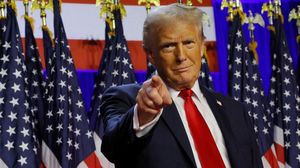Donald Trump’s post-election political maneuvers are shaping up to be just as controversial as his previous tenure, with significant ambitions and contentious plans ready to shape the economic and political landscapes. With the 2024 elections on the horizon, Trump is making headlines again, primarily through his proposed policies and responses to both domestic and global challenges.
One of the most talked-about issues is his selection of Scott Bessent as his treasury secretary pick. Bessent, known for his background as a hedge fund investor, has introduced what he terms the "3-3-3 plan." This ambitious proposal aims to reduce the federal budget deficit to three percent of GDP by 2028, produce three million additional barrels of oil daily, and spur three percent annual economic growth. According to Bessent, implementing this plan could result in what he calls "an economic lollapalooza."
Historically, the U.S. economy has averaged just over three percent growth since World War II. While such growth may appear achievable, recent figures tell a different story, as the current GDP growth has stagnated to nearly one percentage point lower, prompting questions about the feasibility of Bessent's strategy.
Critics of Trump’s economic approach have voiced concerns, particularly about the potential impacts of deregulation, which forms the backbone of his growth strategy. Cutting regulatory red tape may invigorate certain industries, but it also raises alarm bells about the long-term environmental and social consequences. The instant reactions from analysts highlight skepticism about whether these measures can genuinely kickstart growth or if they merely serve as short-term fixes.
Adding to Trump's agenda, his proposal to eliminate the federal tax credit for electric vehicle purchasers is drawing sharp criticism. This could effectively render electric vehicles too expensive for many Americans, undermining efforts to encourage green technologies. With climate change becoming increasingly urgent, curtailing the adoption of electric vehicles might throw the nation off course from meeting its environmental targets.
Compounding these economic challenges is Trump's approach to immigration reform, which features stark proposals for mass deportations. Critics argue his plans could strain immigration courts, exacerbated by current backlogs as economic uncertainty hangs over many migrant communities. The administration's hardline immigration stance could potentially alienate voters who might otherwise support him, particularly among immigrant demographics.
Trump’s national security policies are likewise stirring debate. By potentially fostering more aggressive stances on international concerns, some analysts predict he could face challenges when trying to negotiate foreign policy deals, particularly with nations like Ukraine and Israel. His recent remarks hint at strategies for rapprochement, but these will be closely watched by both supporters and critics alike.
Despite these potential pitfalls, Trump's staunch base continues to rally behind his leadership, partially attributed to his strong messaging around America’s economic revival. His supporters remain enthused about the prospect of returning to his brand of governance, which they believe will restore the country to its economic roots.
The debates surrounding these economic and political strategies are complicated and multifaceted, stirring passionate opinions on both sides. Some believe Trump’s approach could provide the necessary jolt for revitalizing America's economy, whereas others are staunchly opposed, emphasizing the risks and potential pitfalls involved.
Given the intertwined nature of his plans, it remains clear: Trump's political and economic strategies will continue to dominate the headlines as the election approaches. Many are poised to see how these policies will take shape and whether they will effectively resonate with the wider electorate.
One of the central questions brewing within the American public discourse is whether Trump's time-tested strategies will resonate with new voter demographics over the next electoral season. Although unemployment numbers have shown improvements since his last term, the specter of inflation and rising living costs could prove to be significant hurdles. Many voters feel the pinch as prices rise, leading to questions of whether Trump can effectively bridge the gap between positive growth and affordability challenges.
Trump’s administration is also being criticized for its apparent disregard for bipartisan support; his team announces aggressive plans without significant buy-in from Democratic counterparts. This unilateral approach to governance could create greater division within Congress, especially as Trump openly criticizes Democratic policies and blocks on immigration and healthcare.
With the backdrop of economic uncertainty and rising political tension, tech giants and corporate leaders are watching closely. Many have already shifted strategies to avoid being on Trump's collision course if he does rise to power once again.
Through all of this, Trump continues to capture attention, commanding headlines with each pronouncement. With electrifying statements on his economic vision and governmental reform plans, he remains at the forefront of political discussions. Whether he can execute on his promises or whether they will unravel under the weight of the very system he seeks to overhaul remains to be seen. For many voters and political observers alike, the forthcoming months will be pivotal as they gauge the viability of Trump's economic and political propositions.
Overall, the upcoming election year promises to be filled with pivotal moments, with Trump's new policy proposals likely shaping not only his campaign but also the broader narrative of the political climate leading up to Election Day. How the voters respond to these bold declarations will be key not just for Trump but for the nation at large.
With uncertainty reigniting discussions around policy effectiveness and voter sentiments, this chapter of American politics beckons for engagement, awareness, and, potentially, transformation as the future is increasingly woven with threads of Trump's political legacy.



